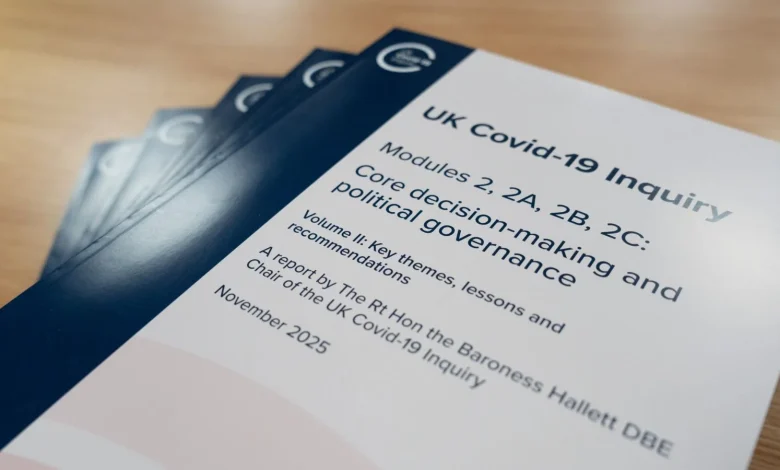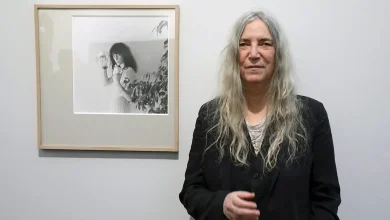All four UK governments ‘failed to appreciate’ scale of COVID pandemic threat – inquiry finds

All four UK governments failed to appreciate the scale of the threat posed by COVID-19 or the urgency of the response the pandemic required, a damning report published on Thursday has claimed.
Baroness Heather Hallett, the chair of the inquiry, described the response to the pandemic as “too little, too late”.
Tens of thousands of lives could have been saved during the first wave of COVID-19 had a mandatory lockdown been introduced a week earlier, the inquiry also found.
Noting how a “lack of urgency” made a mandatory lockdown “inevitable”, the report references modelling data to claim there could have been 23,000 fewer deaths during the first wave in England had it been introduced a week earlier.
The UK government first introduced advisory restrictions on 16 March 2020, including self-isolation, household quarantine and social distancing.
Had these measures been introduced sooner, the report states, the mandatory lockdown which followed from 23 March might not have been necessary at all.
COVID-19 first emerged in the Chinese city of Wuhan at the end of 2019, and as it developed into a worldwide pandemic, the UK went in and out of unprecedented lockdown measures for two years starting from March 2020.
Lady Hallett admitted in her summary that politicians in the government and devolved administrations were forced to make decisions where “there was often no right answer or good outcome”.
“Nonetheless,” she said, “I can summarise my findings of the response as ‘too little, too late'”.
Report goes long way to answer inquiry’s critics
This scathing report goes a long way to answer the Covid 19 Inquiry’s critics who have consistently attacked it as a costly waste of time.
They tried to undermine Baroness Hallet’s attempt to understand what went wrong and how we might do better as a lame exercise that would achieve very little.
Well, we now know that Boris Johnson’s “toxic and chaotic” government could well have prevented at least 23,000 deaths had they acted sooner and with greater urgency.
The response was “too little, too late”. And that nobody in power truly understood the scale of the emerging threat or the urgency of the response it required.
The grieving families who lost loved ones in the pandemic want answers. They want names. And they want accountability.
But that is beyond the remit of this Inquiry.
The publication of the report into Module 2 will bring them no comfort, it may even cause them more distress but it will bring them closer to understanding why the UK’s response to this unprecedented health crisis was so poor.
And we can easily identify the “advisors and ministers whose alleged rule breaking caused huge distress and undermined public confidence”.
Or who was in charge of the Department of Health and Social Care, as it misled the public by giving the impression that the UK was well prepared for the pandemic when it clearly was not.
‘Toxic culture’ at the heart of UK government
The report said there was “a toxic and chaotic culture” at the heart of the UK government during the pandemic.
The inquiry heard evidence about the “destabilising behaviour of a number of individuals” – including former No 10 adviser Dominic Cummings.
It said that by failing to tackle this chaotic culture – “and, at times, actively encouraging it” – former PM Boris Johnson “reinforced a culture in which the loudest voices prevailed and the views of other colleagues, particularly women, often went ignored, to the detriment of good decision-making”.
‘Misleading assurances’
The inquiry found all four governments in England, Scotland, Wales and Northern Ireland failed to understand the urgency of response the pandemic demanded in the early part of 2020.
The report reads: “This was compounded, in part, by misleading assurances from the Department of Health and Social Care and the widely held view that the UK was well prepared for a pandemic.”
The report notes how the UK government took a “high risk” when it significantly eased restrictions in England in July 2020 – “despite scientific advisers’ concerns about the public health risks of doing so”.
Lady Hallett has made 19 key recommendations which, if followed, she believes will better protect the UK in any future pandemic and improve decision-making in a crisis.
In a statement following the publication of Thursday’s report, Baroness Hallett said there was a “serious failure” by all four governments to appreciate the level of “risk and calamity” facing the UK.
She said: “The tempo of the response should have been increased. It was not. February 2020 was a lost month.”
Baroness Hallett said the inquiry does not advocate for national lockdowns, which she said should have been avoided if at all possible.
“But to avoid them, governments must take timely and decisive action to control a spreading virus. The four governments of the UK did not.”
She said none of the governments were adequately prepared for the challenges and risks that a lockdown presented, and that many of the same failings were repeated later in 2020, which she said was “inexcusable”.
“Each government had ample warning that the prevalence of the virus was increasing and would continue to do so into the winter months. Yet again, there was a failure to take timely and effective action.”
This breaking news story is being updated and more details will be published shortly.
Please refresh the page for the latest version.
You can receive breaking news alerts on a smartphone or tablet via the Sky News app. You can also follow us on WhatsApp and subscribe to our YouTube channel to keep up with the latest news.



![Just released: the 3 best growth-focused stocks to consider buying in November [PREMIUM PICKS]](https://cdn1.emegypt.net/wp-content/uploads/2025/11/Just-released-the-3-best-growth-focused-stocks-to-consider-buying-390x220.webp)

